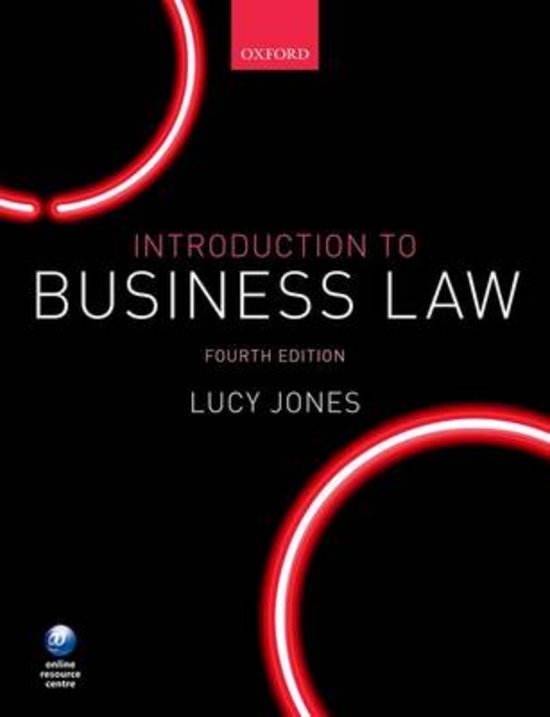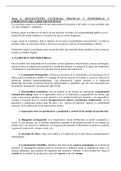International business awareness: law
Chapter 4
A contract is an agreement made between two or more parties which is legally
binding on them. Not all agreements between parties are legally enforceable. The
law will only enforce agreements where the parties intended to be legally bound and
where the agreement involves some kind of exchange. The court does not force a
party to carry out the contract. If there is a breach of contract the court will provide a
remedy for the other party.
The sources of contract law are case law (relating to agreements) and legislation.
Essentials of a contract
Standard form contract
- Used by many large businesses
- The terms are set out on a document prepared by the organization.
- Terms are not negotiable
For example: passengers are not permitted to consume food whilst traveling on
board of any coach
Sometimes certain terms are implied into contracts by statue or common law. The
contractual parties are bound by these terms even though they did not agree to
them. Certain statues prohibit some types of contractual clauses and if such clauses
are included in a contract, they will have no legal effect.
Issues in contract law
Contract law is concerned with three basic issues. Firstly, is there a contract? In
order to be legally binding, a contract must have five elements:
- An agreement: a valid offer and acceptance
- The intention of the parties to create a legal agreement
- Consideration: a promise to give or do something in return for a similar
promise
- Legal capacity to make a contract (there are some restrictions on persons
such as mentally ill and minors entering into contracts)
- Form (some must be in writing or by deed)
Secondly, is the agreement one which the law recognizes? Thirdly, when do the
obligations of the parties to the contract come to an end and what remedies are
there if one of the parties breaks some or all of the terms of the contract?
A contract will not be legally binding if its terms are contrary to statue or common
law.
Void contract: if a contract is void, this means that there is no contract and never has
been a contract
Voidable contract: it is a contract that is binding on one party but the other party has
the option to have it set aside.
An unenforceable contract is a contract that the parties are at the liberty to carry out,
but if one if the parties refuses to carry out their side of the contract the courts will
not enforce it.
, The majority of contracts are bilateral. This is where a promise by one party is given
in exchange for a promise by the other party. A unilateral contract is where one party
promises to do something, usually in return for completion of a specified act. The
other party does not have to promise to carry out the act.
Simple or parol contracts: contracts which can be made in any form
Specialty contracts: contracts have to be in a particular form to be legally
enforceable
A deed is a type of written agreement which states on the agreement that it is a
deed. It must be signed by the persons making it and a witness. All transfers
conveying land and leases of land for more than three years must be made by deed.
The transfers of shares in limited companies and contracts for the sale of land in the
future must be in writing
The offer
A valid offer contains what the party intends to do and what the other party agrees to
do in return. The person who makes the offer is called the offeror. The person who
accepts the offer is called the offeree. An offer can be made to one person or a
group. There are a number of common law rules which must be applied in deciding
whether a statement is an offer:
- An offer must be clear
- An offer must be distinguished from an invitation to treat. An invitation to treat
is not an offer that is capable of being accepted by the other party. It is an
indication that the other party is open to negotiation. For example display of
goods in shops and shop windows, applications inviting tenders, catalogues
and prospectuses.
- An offer must be distinguished from a statement giving information or
expressing an intention
- An offer must be distinguished from a mere puff or boast.
- An offer must be communicated to the other party
An offer can be brought to an end in different ways:
- Termination by revocation: revocation of an offer means that the offer to make
a contract is withdrawn. If the offeror has promised to keep his offer open and
the offeree has given him something in return, then the offeror is contractually
bound by his promise.
Withdrawal of offers in unilateral contracts: if an offer has been made,
the offeree should be given a reasonable time to complete the contract
one performance has begun.
- Termination by lapse of time: sometime an offer has a time limit and will
expire at the end of this time limit.
- Termination by death: an offeree is unable to accept and offer when he is
dead.
- Termination by rejection and counter offer: if an offer is rejected is ceases to
exist and a person cannot later purport to accept it. A counter offer is usually
an offer made in reply to an offer. A request for information about an offer is
not a counter offer.
Chapter 4
A contract is an agreement made between two or more parties which is legally
binding on them. Not all agreements between parties are legally enforceable. The
law will only enforce agreements where the parties intended to be legally bound and
where the agreement involves some kind of exchange. The court does not force a
party to carry out the contract. If there is a breach of contract the court will provide a
remedy for the other party.
The sources of contract law are case law (relating to agreements) and legislation.
Essentials of a contract
Standard form contract
- Used by many large businesses
- The terms are set out on a document prepared by the organization.
- Terms are not negotiable
For example: passengers are not permitted to consume food whilst traveling on
board of any coach
Sometimes certain terms are implied into contracts by statue or common law. The
contractual parties are bound by these terms even though they did not agree to
them. Certain statues prohibit some types of contractual clauses and if such clauses
are included in a contract, they will have no legal effect.
Issues in contract law
Contract law is concerned with three basic issues. Firstly, is there a contract? In
order to be legally binding, a contract must have five elements:
- An agreement: a valid offer and acceptance
- The intention of the parties to create a legal agreement
- Consideration: a promise to give or do something in return for a similar
promise
- Legal capacity to make a contract (there are some restrictions on persons
such as mentally ill and minors entering into contracts)
- Form (some must be in writing or by deed)
Secondly, is the agreement one which the law recognizes? Thirdly, when do the
obligations of the parties to the contract come to an end and what remedies are
there if one of the parties breaks some or all of the terms of the contract?
A contract will not be legally binding if its terms are contrary to statue or common
law.
Void contract: if a contract is void, this means that there is no contract and never has
been a contract
Voidable contract: it is a contract that is binding on one party but the other party has
the option to have it set aside.
An unenforceable contract is a contract that the parties are at the liberty to carry out,
but if one if the parties refuses to carry out their side of the contract the courts will
not enforce it.
, The majority of contracts are bilateral. This is where a promise by one party is given
in exchange for a promise by the other party. A unilateral contract is where one party
promises to do something, usually in return for completion of a specified act. The
other party does not have to promise to carry out the act.
Simple or parol contracts: contracts which can be made in any form
Specialty contracts: contracts have to be in a particular form to be legally
enforceable
A deed is a type of written agreement which states on the agreement that it is a
deed. It must be signed by the persons making it and a witness. All transfers
conveying land and leases of land for more than three years must be made by deed.
The transfers of shares in limited companies and contracts for the sale of land in the
future must be in writing
The offer
A valid offer contains what the party intends to do and what the other party agrees to
do in return. The person who makes the offer is called the offeror. The person who
accepts the offer is called the offeree. An offer can be made to one person or a
group. There are a number of common law rules which must be applied in deciding
whether a statement is an offer:
- An offer must be clear
- An offer must be distinguished from an invitation to treat. An invitation to treat
is not an offer that is capable of being accepted by the other party. It is an
indication that the other party is open to negotiation. For example display of
goods in shops and shop windows, applications inviting tenders, catalogues
and prospectuses.
- An offer must be distinguished from a statement giving information or
expressing an intention
- An offer must be distinguished from a mere puff or boast.
- An offer must be communicated to the other party
An offer can be brought to an end in different ways:
- Termination by revocation: revocation of an offer means that the offer to make
a contract is withdrawn. If the offeror has promised to keep his offer open and
the offeree has given him something in return, then the offeror is contractually
bound by his promise.
Withdrawal of offers in unilateral contracts: if an offer has been made,
the offeree should be given a reasonable time to complete the contract
one performance has begun.
- Termination by lapse of time: sometime an offer has a time limit and will
expire at the end of this time limit.
- Termination by death: an offeree is unable to accept and offer when he is
dead.
- Termination by rejection and counter offer: if an offer is rejected is ceases to
exist and a person cannot later purport to accept it. A counter offer is usually
an offer made in reply to an offer. A request for information about an offer is
not a counter offer.






